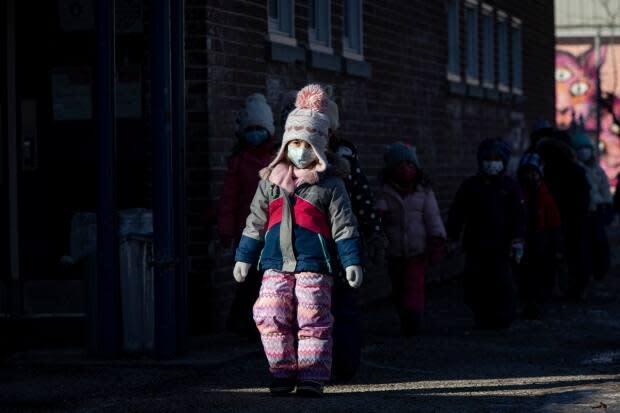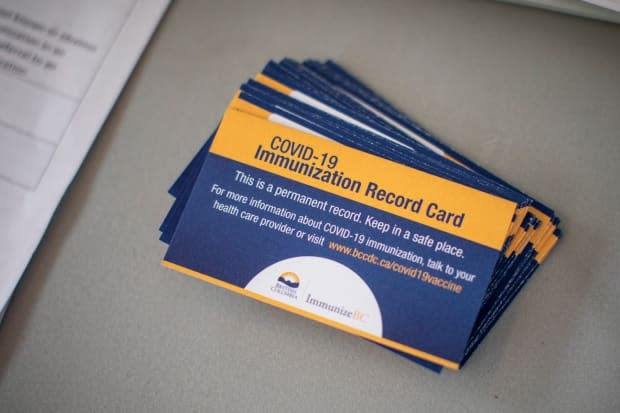Here's what we know about COVID-19 vaccines and children

Most provinces, including British Columbia, announced this week they expect every adult will receive a first COVID-19 vaccine dose by June or July.
The move came after a recommendation by the National Advisory Committee on Immunization (NACI) to delay a second dose for four months, following evidence of high levels of protection from one dose.
All provinces have adopted the recommendation, potentially accelerating Canada's vaccination timeline by two months.
But where does that leave kids?
Close to one million people in B.C. are 19 or younger, and they make up nearly one-fifth of the province's population.
Here's what you need to know about where they fall in the vaccination plan.
Can kids get vaccinated?
Not yet.
Health Canada has approved the Pfizer-BioNTech vaccine for people aged 16 and older, while the Moderna, Oxford-AstraZeneca and Johnson & Johnson vaccines are approved for those 18 and up.
Health Canada's chief medical adviser, Supriya Sharma, has said there's not enough data from the initial clinical trials to know how the vaccines affect kids.
So far, B.C.'s immunization plan is focused on residents 18 and older.
B.C.'s health ministry said it will administer Pfizer vaccines to teens between the ages of 16 and 17 who are severely clinically vulnerable, and whose care provider has determined vaccination is the best course of action.
Do kids need to be immunized?
Dr. Manish Sadarangani, a pediatric infectious disease specialist and director of the Vaccine Evaluation Centre at B.C. Children's Hospital, said it's not yet not clear whether all kids need to get vaccinated.
He is currently leading research that is testing children across B.C. for COVID-19 antibodies to understand asymptomatic infections and better estimate the true infection rate among younger people.
Experts will also have a clearer picture once most adults are vaccinated, Sadarangani said.
At that point, health officials can look at the number of cases among kids, whether severe cases are showing up and whether kids are a source of ongoing community transmission.

Fiona Brinkman, a professor in the molecular biology and biochemistry department at Simon Fraser University in Burnaby, said children should "definitely" be vaccinated.
"Getting COVID is much worse in terms of potential for long-term side effects than getting the vaccine," said Brinkman, who is also working on Canada's variant containment efforts through the Canadian COVID-19 Genomics Network.
When will kids receive a vaccine?
The four pharmaceutical companies are at all different stages of testing the vaccines on kids.
It's unclear when exactly those vaccines could be approved for kids. Sharma said Friday that data from teenagers will come first, followed by kids under 12.
"Potentially, by the end of the calendar year, we might have some answers for children."

Sadarangani said the first clinical trial data from older kids is expected to come by the end of August.
If the Health Canada approves the vaccines on kids, NACI will then recommend how to best deploy the doses, he said.
Sadarangani said rolling out the vaccine as part of school immunizations will be far more efficient than immunizing adults, noting the system is "better set up" to vaccinate kids.
Is achieving 'herd immunity' possible without vaccinating kids?
Some experts have suggested that achieving "herd immunity" — the point at which the virus can no longer spread in the community because enough people have either been infected or vaccinated — may not be feasible without vaccinating kids.
Brinkman said it's a reasonable concern, but the degree of protection to society from vaccines make them a powerful tool, even before they're available to children.
"We have vaccines that have incredible efficacy. In fact, they're astounding," she said.
"When you have vaccines that work that well, you don't actually have to vaccinate as many people in the population to have it be effective."

Anna Blakney, an assistant professor at University of British Columbia's school of biomedical engineering, said herd immunity is often thought of as a percentage of a population that must be protected to ensure safety for all.
But it's actually a more dynamic concept, she said, especially since it's unknown how long immunity from COVID-19 will last.
"With herd immunity, you don't just reach that level and then it's there forever," she said.
"People can lose their immunity over time, so most likely what's going to happen is that it will be a combination of natural infections and the vaccine that get us to that kind of steady state of herd immunity."
Are there safety concerns for kids?
Blakney, who also runs a popular TikTok account that educates viewers about COVID-19, said she's received many questions about the safety of the vaccine in children.
She said clinical trials are generally designed with less vulnerable populations in mind — those between the age of 18 and 55. (Because COVID-19 disproportionately affects the elderly, older people were included in vaccine trials.) Once a vaccine is found to be safe in those populations, they're expanded out to children and pregnant women.
"It's routine for children and babies to get vaccines. That's when you get the most vaccines in your life. They're just waiting for that safety to be proven," Blakney said.
"We want to first test it in the less vulnerable population in case there are any side effects. That doesn't mean we expect there to be — that's just how it's evolved over time."
Sadarangani explained that the dose may be adjusted to ensure the best protection possible for children.
"Some vaccines do need a bit more because they need a bit more to stimulate their immune systems than adults do. And some vaccines, they need a bit less," he said.
"This is one of the reasons in the trial for going down through the age groups, starting with the older kids that are likely to be most like adults."
What about parents who are hesitant to vaccinate their kids?
In a UBC study last fall, about 43 per cent of 2,500 families across Canada surveyed said they would accept less rigorous testing and expedited approval of a vaccine for their kids.
Blakney said she finds some degree of vaccine hesitancy normal, especially because people are not accustomed to the speed with which the vaccine was developed.

But she said the vaccine research involved an unprecedented level of funding and effort from scientists, doctors, and governments alike.
"We have lots of safety data on this because not only were they trialled in tens of thousands of people, but now they've been implemented to millions of people," she said.
"So we have a pretty good idea of the safety profile of them thus far, which is what gives us that extra confidence to go into other populations. These vaccines are incredibly safe in the data we have so far."
What can parents do in the meantime?
Brinkman said, for now, parents can ensure that their children's other vaccinations and booster shots are up to date, while also following public health orders until restrictions can safely be lifted.
"That will help protect them and give their system the best chance against other diseases," she said, adding some people may have fallen behind schedule on immunizations while B.C. has been partially shut down.
"It's very important at this stage that we keep the numbers of cases as low as we can because we really need to reduce the chance of the viral variant spreading."

